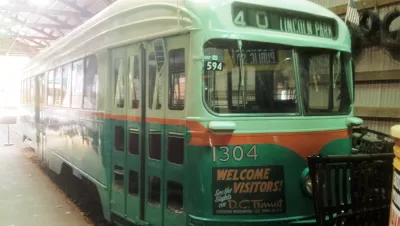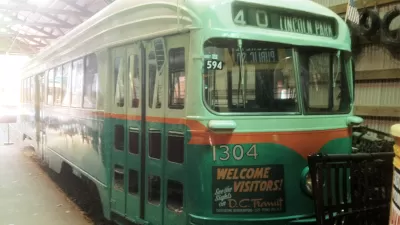In a recent move, officials from Mayor Vincent C. Gray's administration shortened DC's streetcar system to a much-shorter eight miles.

Instead of the grand 20-plus-mile system officials planned to construct within a decade to crisscross through Washington D.C., the streetcar lines will only be eight miles, costing about $800 million dollars.
As reported in the Washington Post by Michael Laris, "Gray’s team blamed the D.C. Council for the reduced goal, saying the council’s vote in May to cut future funding was misguided and left no other responsible choice," while members from the City Council argued Gray is unable to collaborate in solving these problems.
As Councilmember Mary Cheh (Ward 3) shared with Laris, "We had a vision. We had a plan... We should try to stick to it. Of course, financing can prove to be difficult, but we’ve worked our way through things before, and I think we can do it again. We shouldn’t give up on this."
FULL STORY: D.C. officials radically scale back streetcar plans

Maui's Vacation Rental Debate Turns Ugly
Verbal attacks, misinformation campaigns and fistfights plague a high-stakes debate to convert thousands of vacation rentals into long-term housing.

Planetizen Federal Action Tracker
A weekly monitor of how Trump’s orders and actions are impacting planners and planning in America.

In Urban Planning, AI Prompting Could be the New Design Thinking
Creativity has long been key to great urban design. What if we see AI as our new creative partner?

King County Supportive Housing Program Offers Hope for Unhoused Residents
The county is taking a ‘Housing First’ approach that prioritizes getting people into housing, then offering wraparound supportive services.

Researchers Use AI to Get Clearer Picture of US Housing
Analysts are using artificial intelligence to supercharge their research by allowing them to comb through data faster. Though these AI tools can be error prone, they save time and housing researchers are optimistic about the future.

Making Shared Micromobility More Inclusive
Cities and shared mobility system operators can do more to include people with disabilities in planning and operations, per a new report.
Urban Design for Planners 1: Software Tools
This six-course series explores essential urban design concepts using open source software and equips planners with the tools they need to participate fully in the urban design process.
Planning for Universal Design
Learn the tools for implementing Universal Design in planning regulations.
planning NEXT
Appalachian Highlands Housing Partners
Mpact (founded as Rail~Volution)
City of Camden Redevelopment Agency
City of Astoria
City of Portland
City of Laramie




























